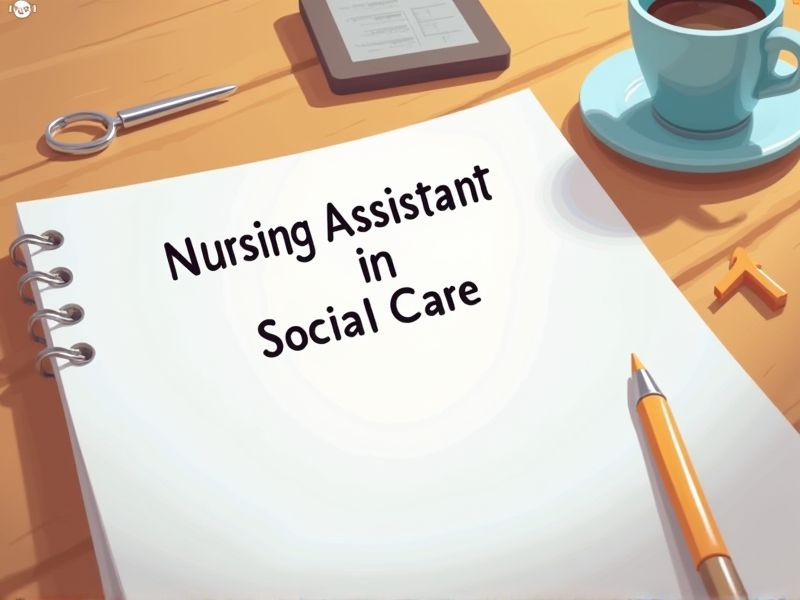
The increasing complexity of social care demands a workforce equipped with specialized skills, making certifications crucial for Nursing Assistants. These certifications ensure that assistants can deliver safe and effective care, addressing the varied needs of patients. Regulatory bodies often mandate certifications to uphold industry standards and enhance patient outcomes. Here are some important certifications you may need as a Nursing Assistant in Social Care.
State Certified Nursing Assistant (CNA) Certification
Acquiring State Certified Nursing Assistant (CNA) Certification ensures that nursing assistants possess the necessary skills and knowledge to provide safe and effective care. The certification process establishes a standardized level of competency, reducing the risk of error in social care settings. Employers in social care often require certification as it validates an individual's commitment to the profession and adherence to recognized practice standards. Certified assistants improve patient outcomes and elevate the quality of care in social care environments.
Basic Life Support (BLS) Certification
Basic Life Support (BLS) Certification equips nursing assistants with essential skills for responding to emergencies, enhancing patient survival rates in critical situations. This certification ensures nursing assistants can perform effective CPR and operate AEDs, crucial for managing sudden cardiac arrests. Knowledge from BLS training improves confidence in emergency settings, fostering a safer environment within social care facilities. Employers often require BLS Certification to meet healthcare industry standards, reflecting competence and readiness to handle life-threatening scenarios.
Cardiopulmonary Resuscitation (CPR) Certification
CPR certification equips nursing assistants in social care with the critical skills required to respond effectively to cardiac emergencies, enhancing patient survival chances. Nursing assistants often serve as first responders in care settings, where immediate CPR can mitigate the effects of cardiac arrest before medical professionals arrive. Certification ensures that nursing assistants demonstrate competence and confidence in performing life-saving procedures, aligning with healthcare standards. Employers expect nursing assistants to be certified in CPR to comply with regulatory requirements and maintain a safe environment for residents.
First Aid Certification
First aid certification equips nursing assistants with essential skills to respond effectively to health emergencies, significantly improving patient outcomes in social care environments. Knowing first aid protocols enables them to act swiftly, reducing the severity of injuries and preventing complications until professional medical help arrives. Certification ensures they are updated on the latest guidelines, fostering a safer environment for both patients and staff. Employers often require this certification as part of their quality care standards, ensuring compliance and enhancing the reputation of the care facility.
Infection Control Certification
Infection control certification ensures that nursing assistants in social care understand and can implement effective measures to prevent the spread of infectious diseases. Increased knowledge in infection control contributes to maintaining the health and safety of both patients and staff in social care environments. With certification, nursing assistants demonstrate competence and commitment to industry best practices, which can enhance the reputation of the care facility. Regulatory bodies often mandate infection control training to comply with health standards, ensuring that care facilities meet their legal obligations.
HIPAA Privacy and Security Certification
HIPAA Privacy and Security Certification is needed to ensure nursing assistants in social care understand and comply with federal regulations safeguarding patient information. This knowledge reduces the risk of data breaches, which can lead to significant legal and financial penalties. Proper training promotes trust between patients and caregivers, enhancing the overall quality of care. Familiarity with these standards helps in preventing unauthorized access to sensitive health information.
Dementia Care Certification
Dementia Care Certification equips nursing assistants with specialized skills to address the complex needs of individuals with dementia, which enhances patient safety and improves quality of care. Understanding dementia-specific communication techniques helps in reducing patient agitation and stress. Certification reinforces the ability to recognize and respond to different stages of dementia, ensuring personalized care for each resident. The growing prevalence of dementia globally demands that caregivers are adequately trained, hence certification becomes integral in meeting this requirement.
Geriatric Care Certification
A Geriatric Care Certification equips nursing assistants with specialized skills to address the unique health challenges faced by elderly individuals, leading to improved patient outcomes. Training in geriatric care enhances communication with older adults, crucial for understanding their needs and ensuring effective care. Certified assistants often become adept at recognizing age-related conditions early, allowing for timely interventions and preventative care measures. Facilities can reduce healthcare costs and improve service quality by employing certified nursing assistants, as they are prepared to handle complex geriatric issues.
Communication Skills Certification
Improved communication skills in nursing assistants lead to enhanced patient outcomes by reducing misunderstandings and ensuring accurate information exchange. Certification in communication skills for nursing assistants builds trust with patients and their families, facilitating a supportive care environment. Enhanced communication competencies among nursing assistants correlate with better teamwork, improving overall healthcare delivery. Training in communication skills equips nursing assistants to manage difficult conversations, critical for addressing sensitive topics in social care settings.
OSHA Compliance Certification
Obtaining OSHA Compliance Certification ensures a nursing assistant in social care understands and adheres to workplace safety standards, minimizing the risk of injury. This certification also helps in maintaining a safe environment for both patients and staff, reducing the likelihood of accidents that can occur from hazards. It equips nursing assistants with knowledge on handling biological hazards, crucial in preventing the spread of infectious diseases. Meeting compliance standards can also protect facilities from legal liabilities, ensuring they meet regulatory requirements.
Summary
When you, as a Nursing Assistant in Social Care, obtain certifications, your expertise and knowledge deepen, enhancing care quality. This progression can result in increased responsibility and recognition within your workplace. The certifications often lead to career advancement opportunities and potential salary increases. Enhanced skills and knowledge also contribute to improved patient outcomes and satisfaction.
